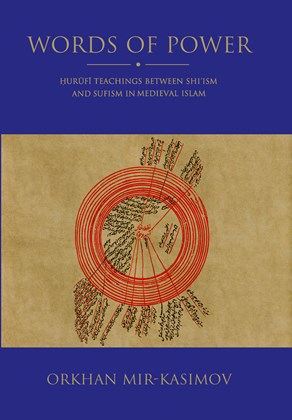Words of Power Ḥurūfī Teachings between Shiʿism and Sufism in Medieval Islam. The Original Doctrine of Faḍl Allāh Astarābādī
I.B. Tauris in association with the Institute of Ismaili Studies
This book is also available OPEN ACCESS to download or read online for free.
The Jāwidān-nāma-yi kabīr (‘Great Book of Eternity’) was the magnum opus of Faḍl Allāh Astarābādī (d. 796/1394) and provided the basis of the Ḥurūfī movement. Today it is one of the most important known texts belonging to the mystical and messianic current that became particularly active in Iran and Anatolia following the Mongol rule. It illuminates the contemporary reconfiguration of religious and political authority along messianic and charismatic lines that took place in the Islamic East, which arguably contributed to the rise and consolidation of the Ottoman, Safawid and Mughal dynasties. Words of Power is the first comprehensive study of Faḍl Allāh's seminal work. Orkhan Mir-Kasimov summarises Faḍl Allāh's biography, charts the history of the Ḥurūfī movement, contextualises the Jāwidān-nāma within Islamic intellectual history, and considers its lasting impact in the Muslim world.
Note on Transliteration and Conventions
Preface and Acknowledgements
Introduction
Faḍl Allāh Astarābādī and his Followers
Overview of Academic Research and the Purpose of the Present Book
Puzzle of Fragments: Structure and Language of the Jāwidān-nāma-yi kabīr
Part I. Cosmogony and Cosmology: The Language of the Creation
1. Primordial Unity: The Semantics of the Creation
2. Manifestation of the Invisible: The Morphology of the Creation
3. Adam and Eve: The Form of the Word
4. Excursus on Knowledge and Love
5. Time: The Receptacle of the Word
6. The Universe: Diversity in the Unity of the Word
Part II : Prophetology: The Descent of the Word and its Return to the Origin
7. Adam and Eve: The Prototype of Prophetic Experience and the Personification of the Prophetic Cycle
8. The Revelation (Tanzīl): From the Divine to the Human Language
9. From the Human Word to the Divine Word: Stages of the Return to the Origin (Taʾwīl)
Joseph: The Taʾwīl of Compound Units
Moses: Fragmentation and Taʾwīl
Solomon: The ‘Language of the Birds’
10. Jesus and Muḥammad: The ‘Motherly’ (Ummī) Prophets between Tanzīl and Taʾwīl
Jesus, Son of Mary
Muḥammad and the Revelation of the ‘Mother of the Book’
11. From Idrīs to Moses: Other Significant Features of the Prophetic Missions
Part III : Soteriology and Eschatology
12. Ways of Individual Salvation: Paradise of Knowledge and Hell of Ignorance
13. The Last Stage of the Cycle of the Word: The Ummīs and the End of Time
Conclusion: The Jāwidān-nāma in the Context of Islamic Thought
The Jāwidān-nāma as Qurʾānic Commentary
The Jāwidān-nāma, Sufism and Esoteric Shiʿism
The Messianic Project of the Jāwidān-nāma and the Use of Christian Apocalyptic Texts
Final Notes
Glossary of Key Technical Terms
Inventory I: Ḥadīths and Sayings
Inventory II: Biblical Citations
Index of Qurʾānic Quotations
Persian Text of the Citations
Anonymous Note concerning the Thematic Organisation of the Fragments of the Jāwidān-nāma
Citations from the Jāwidān-nāma
Citations from the Works of Faḍl Allāh’s Followers
Astarābādī Vocabulary
Bibliography
General Index
Orkhan Mir-Kasimov obtained his PhD in Islamic studies from the École Pratique des Hautes Études (Sorbonne University, Paris), and has lectured at the École Pratique as well as the National Institute of Oriental Languages and Civilisations (INALCO) in Paris. He is currently a Research Associate at The Institute of Ismaili Studies in London. He has published several articles and book chapters on various aspects of Ḥurūfī thought as well as on broader issues related to Islamic mysticism and messianism. His edited volume, Unity in Diversity: Mysticism, Messianism and the Construction of Religious Authority in Islam, was published in 2013.

